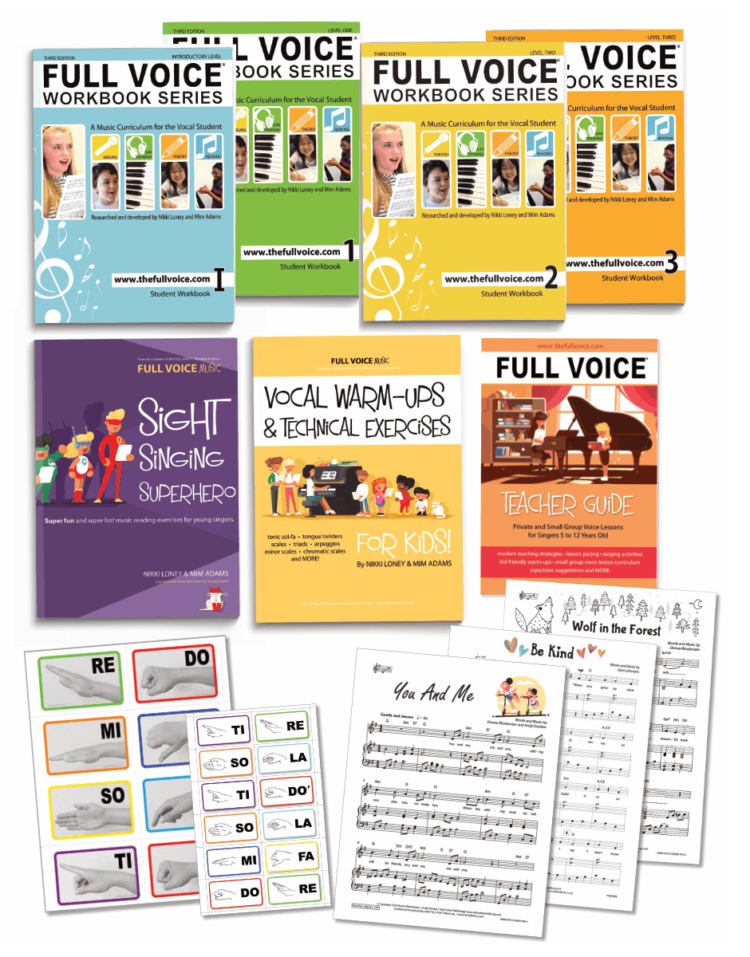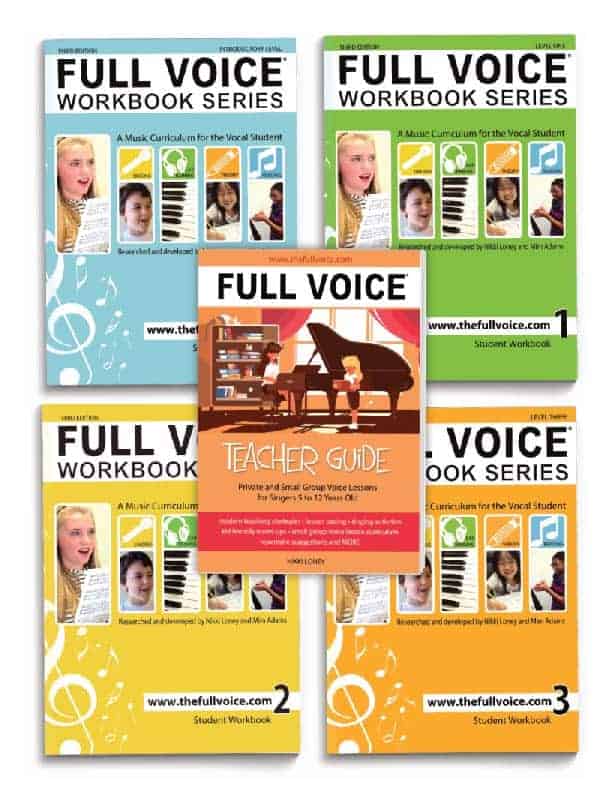10 fun and educational music activities for little (little) singers
“A lesson for a young student looks different from a traditional lesson…with very young musicians the goal is creative play rather than traditional voice study.”
Music educator and guest blogger, Christin Coffee Rondeau shares 10 fun ideas to engage the little (little) singers! (because they are ready for voice lessons!)
It has happened to every private voice teacher—a parent calls, asking if you are willing to teach her five year-old (or six or four or however old!). You pause, several thoughts running through your head.
1. The money would be nice.
2. I don’t love working with kids.
3. What do I even do with a five year-old for half an hour?
And, if you’re like most of us, you probably conclude that it won’t work and refer her to a group music class or piano lessons.
While group classes and piano lessons are fabulous, important experiences for all musicians, voice teachers should remember that there is no rule stating that we should not work with young children. We just have to be willing to modify our approach…or use an entirely new approach! A lesson for a young student looks different from a traditional voice lesson, and it is beneficial for us to adjust our processes and expectations (and help parents to adjust theirs!).
With very young musicians, the goal is creative play rather than traditional voice study. The ideas below are useful for helping children develop their ears and voices and build a solid musical foundation. The most crucial aspect of all of this is to not become too tied to an objective—keep it light, improvisatory, and playful!
So here we go!
1. a) Songs with small pitch sets
Sol-mi, then sol-mi- re-do, then la-sol- mi-re- do. When selecting a song, think “Could I hear this being sung on the playground?” Feel free to incorporate Curwen hand signs—even the tiniest singers will pick up on it quickly!
1. b) Folk songs
Go for songs that have memorable characters, silly or unusual words. Kids will love acting these or inventing dances to them.
- She’ll Be Comin’ Round the Mountain
- Skip To My Lou
- Shoo Fly
- Froggie Went A’ Courtin’
- Liza Jane
- Great Big House
2) Movement
Play a tempo on temple blocks, hand drum, piano, floor, whatever, and ask students to put the beat in their feet. (If it’s a portable instrument, move with them.) Switch meters, dynamics, etc. and experiment with how they can demonstrate those changes in their bodies.
3) Play with clapping games
Then see if you can find a way to incorporate those clapping games into a song.
4) “Echo Back” body percussion
Demonstrate a simple, two-beat pattern using either stomps, pats,or claps, and have students imitate you. Have them take turns being the leader while you echo them. (As they gain confidence, extend to four-beat patterns of increasing complexity.)
5) Vocal Exploration
There are many sets of free vocal exploration cards available for download. You can provide a shape and ask students to make that shape with their bodies or with a ribbon or scarf, and then ask how it would sound in their voices. (High? Low? Loud? Soft? Funny sound effects like tongue clicking?)
6) Nursery Rhymes
First teach by rote, then see if you can repeat together while keeping a steady beat in your feet. (Just one or two lines are sufficient if students can’t remember the whole thing.) Then layer on a simple sol-mi melody. You can then add piano or guitar accompaniment, students can add body percussion or movement, you can work together to create a mini-tableau, etc. Endless possibilities here!
7) Rondo form
Any and all of these ideas can be combined to make a performance piece– Students can decide! “We have our melody– how many times should we sing it? Great! What should we do after that? Clap? Dance? Should we end by singing the same melody or something different?”)
8) Finger plays
“Here is the Church, Here is the Steeple”, “Round and ‘Round the Garden”, “Five Little Monkeys”. Again, consider using these with a different piece to come up with a longer, performable unit.
9) Children’s books
If you have a favorite children’s book with a repeating theme or phrase. Try these for a start:
- Are You My Mother?
- Click Clack Moo
- The Pout-Pout Fish
you can work together to “compose” a melody for the refrain and sing it when you read the book. (Again, keep the pitch set small, and try to end in mi-re- do.)
10) Solfège scramble
Print out several sets of Nikki’s free, downloadable tonic sol-fa cards, and pull out all the “sol” and “mi” cards. Have students arrange the sol and mi cards on the floor in whatever order they choose, then sing their melody. Consider adding text to it. Once they’re solid, you can add in new pitches, one at a time (eventually, students will catch on that their songs sound really great when they end on “do”!).
Other (super important) thoughts
Remember that the goal is not to teach. Whatever concept you’re trying to convey will be better retained if students discover it themselves. (This is true of older students as well.) Do your best to ask questions that get them thinking and analyzing so that they can start to make their own informed musical choices. Consider incorporating movement as much as possible. Additionally, do your best to make everything open-ended and “layerable” so that young students have the freedom to improvise, play, and create.
So much of this seems very basic to a professional musician, but, sadly, kids are often not taught elemental music and are not empowered to creatively explore. Our role in helping students learn how to explore and enjoy music is HUGELY essential to their overall artistic development. What an honor and privilege to guide these young artists in their musical journeys!
Below are some resources to help you feel confident as you work with young musicians. Please note that the aforementioned ideas barely scratch the surface of resources available to music educators, and I cannot speak highly enough of the Orff Levels courses. If you choose to attend a levels course or even just a one-day workshop, you will walk away a richer musician and pedagogue for it! Free to email me if you have questions or want to brainstorm!
Happy singing! ~Christin
Source Material
1) Searchable folk song database, Holy Names University: http://kodaly.hnu.edu/collection.cfm
2) Folk songs w/lesson plans and activities:
- Beth’s Notes Plus: http://www.bethsnotesplus.com
- Make Moments Matter: http://www.makemomentsmatter.org/content
3) Any anthology of nursery rhymes
4) The Songs and Studies for Kids! by Full Voice Music (-:
Music Ed/Orff Resources
1) The American Orff Schulwerk Association: http://aosa.org/about/what-is- orff-schulwerk/
2) AOSA Levels courses and chapter workshops: http://aosa.org/chapters/
3) Jane Frazee’s “Discovering Orff: A Curriculum for Music Teachers”—Contains an overview of the Orff philosophy and a breakdown of goals and activities by age group. https://www.amazon.com/Discovering-Orff- Curriculum-Teachers-Schott/dp/0930448995
About our guest contributor:
Hi! I’m Christin, and I love helping musicians of all ages discover their voices. I have a Bachelor’s and a Master’s in Vocal Performance and a Level 2 Orff Certification. I’ve been making music my whole life, have formally studied voice for over 15 years, and have been teaching privately for over a decade. You can find me teaching at Sand Dollar Music in Dayton, Ohio.





